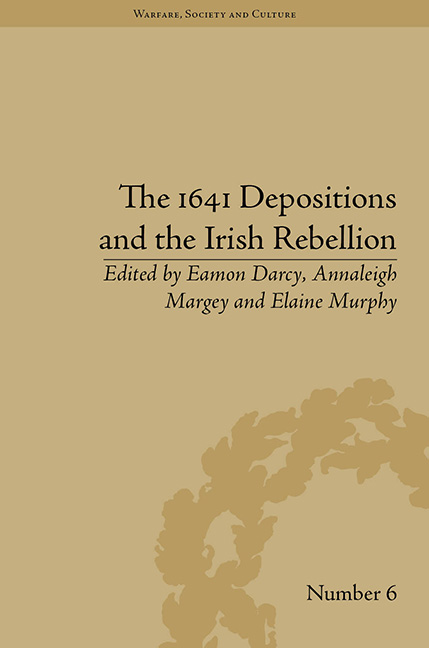Book contents
- Frontmatter
- CONTENTS
- Dedication
- Acknowledgements
- List of Contributors
- List of Figures and Tables
- List of Abbreviations
- Preface
- Introduction
- Part I The Outbreak of the Rebellion
- Part II Social Aspects of the Rebellion
- 5 ‘In Monies and Other Requisites’: The 1641 Depositions and the Social Role of Credit in Early Seventeenth-Century Ireland
- 6 1641 and the Ulster Plantation Towns
- 7 The Social Order of the 1641 Rebellion
- 8 ‘Rogues, Villaines & Base Trulls’: Constructing the ‘Other’ in the 1641 Depositions
- Part III Political and Military Aspects of the Rebellion
- Conclusion: The Rebellion in Text and Context
- Notes
- Index
5 - ‘In Monies and Other Requisites’: The 1641 Depositions and the Social Role of Credit in Early Seventeenth-Century Ireland
from Part II - Social Aspects of the Rebellion
- Frontmatter
- CONTENTS
- Dedication
- Acknowledgements
- List of Contributors
- List of Figures and Tables
- List of Abbreviations
- Preface
- Introduction
- Part I The Outbreak of the Rebellion
- Part II Social Aspects of the Rebellion
- 5 ‘In Monies and Other Requisites’: The 1641 Depositions and the Social Role of Credit in Early Seventeenth-Century Ireland
- 6 1641 and the Ulster Plantation Towns
- 7 The Social Order of the 1641 Rebellion
- 8 ‘Rogues, Villaines & Base Trulls’: Constructing the ‘Other’ in the 1641 Depositions
- Part III Political and Military Aspects of the Rebellion
- Conclusion: The Rebellion in Text and Context
- Notes
- Index
Summary
Lending and borrowing … whereby the soul of traffic is breathed into the body of a commonwealth … [and] whereby we accommodate one another … in monies and other requisites.
This quote from Thomas Powell's 1635 economic tract, The Art of Thriving, succinctly portrays the fundamental basis of borrowing and lending in the early seventeenth-century. Intense studies by Craig Muldrew have shown that, in England, almost all buying and selling involved credit of one form or another and practically every household, from pauper to nobility, was to some degree enmeshed within the complex systems of credit which existed in the period. Similarly, Jane Ohlmeyer has commented that in early seventeenth-century Ireland ‘credit was a levelling force within the community and reciprocal ties of indebtedness bound rich and poor alike irrespective of ethnicity or religion’. Yet, apart from an examination of credit and monetary problems in Munster and a brief look at the level of indebtedness in Connacht little attempt has been made to consider the importance of the social and commercial role that credit played in Irish society in the period. This was addressed to a large extent by a recent study on Dublin merchants which demonstrated that trade transactions in particular depended on credit systems and that merchants and other members of Irish society were heavily involved in the complex web of credit across the commercial world, but also that borrowing, lending and participation in networks of credit were a fundamental and integral part of day-to-day life across the whole social spectrum.
These studies have looked briefly at the 1641 Depositions and other records such as the Tholsel Court records and the Court of Claims as well as extant family papers and correspondence relating to the period. Findings in relation to the level of indebtedness in Irish society, however, have almost exclusively been based on examinations of the statute staple books.
- Type
- Chapter
- Information
- The 1641 Depositions and the Irish Rebellion , pp. 65 - 78Publisher: Pickering & ChattoFirst published in: 2014



